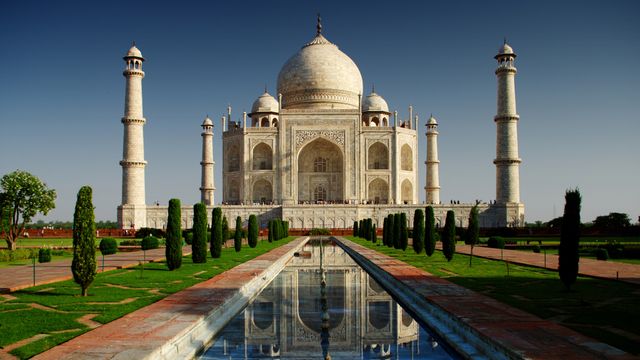4.1.7
TNCs & Globalisation
TNCs - Global Production Networks
TNCs - Global Production Networks
TNCs help globalisation to spread through their global production networks or global supply chains. TNCs do different parts of their operations in different countries to benefit from things like cheaper labour or more relaxed environmental rules.


Offshoring
Offshoring
- Offshoring is where a TNC moves parts of its production process to other countries. This is often developing countries where production costs (e.g. labour or land) are lower.


Outsourcing
Outsourcing
- Outsourcing is where a TNC gives a contract to another company to complete part of their work. For example, they might outsource their call-centres to parts of the world where labour costs are lower.
- Many global TNCs do not make all of their products themselves and outsource the production. They simply attach their branding and logo to the good.


Risks of outsourcing
Risks of outsourcing
- Outsourcing and having a global production network does also bring risks with it. The TNC loses some of its direct control over the production of its goods.
- An example was the horse-meat scandal in the UK in 2013 where UK supermarkets were unaware of horse-meat being used in some dishes.


Examples of offshoring/outsourcing
Examples of offshoring/outsourcing
- Apple iPhones are assembled by Foxconn in China, but iPhones are 'Designed in California'.
- BT outsources some of its call centre work to India to benefit from lower labour costs there. The large English-speaking population of India means that it is possible to have the call-centres of a British TNC in another country.
TNCs and Globalisation
TNCs and Globalisation
Aside from global production networks, TNCs help globalisation to spread and also take advantage of the economic liberalisation that has come with globalisation.


Glocalisation
Glocalisation
- TNCs use glocalisation to help spread globalisation. This means that they adapt their products to the needs of local consumers.
- For example, lots of global food TNCs offer a different menu in India where beef is not eaten.
- Since 2012, McDonald’s has served the McVeggie and McSpicy Paneer in India.


Glocalisation reflecting laws
Glocalisation reflecting laws
- Sometimes, glocalisation reflects the different laws in different countries.
- For example, BMW makes right-hand drive cars for the UK because we drive on the left whereas, in Germany, cars are left-hand drive.


Development of new markets
Development of new markets
- TNCs use the development of new markets to benefit from glocalisation.
- As countries develop and their populations have higher disposable incomes to spend on ‘luxury’ items, TNCs are able to access new markets and sell their products in these countries.


Economic liberalisation
Economic liberalisation
- TNCs take advantage of economic liberalisation. They take advantage of the removal of barriers to trade to earn more profit and increase their market share.
- TNCs use outsourcing and offshoring to make sure that they are able to maximise their profits by minimising the costs of producing their goods.
1Tectonic Processes & Hazards
1.1Tectonic Processes & Hazards
1.2Natural Disasters
1.3Natural Disaster Case Studies
1.4Trends & Patterns
2Option 2A: Glaciated Landscapes & Change
2.1Glaciated Landscapes Over Time
2.2Periglacial Landscapes
2.3Glacial Processes
2.4Glacial Landforms
3Option 2B: Coastal Landscapes & Change
3.1Coastal Landscapes
3.2Coastal Erosion & Deposition
3.3Coastal Risks
4Globalisation
4.1Globalisation
4.2Negatives of Globalisation
4.3Global Shift
4.5Culture
4.6Measuring Development
5Option 4A: Regenerating Places
5.1Types of Economies
5.2Function of Places
5.3Regeneration
5.4Regeneration Case Studies
6Option 4B: Diverse Places
6.1Population Structure
6.2Past & Present Connections
6.3Urban & Rural Spaces
6.4Diversity
6.5Urban & Rural Case Studies
6.6Case Study - Tower Hamlets
6.7Case Study - Sturton-le-Steeple
7The Water Cycle & Water Insecurity (A2 only)
7.1Hydrological Processes Global to Local
7.2Influences on the Water Cycle
7.3Water Insecurity
8The Carbon Cycle & Energy Security (A2 only)
8.1The Carbon Cycle
8.2Energy Consumption
8.3Alternative Energy
8.4Growing Demand for Resources
9Superpowers (A2 only)
9.1Superpowers
9.2Hard & Soft Power
9.2.1Hard & Soft Power
9.2.2Emerging Powers - China Rivalry
9.2.3Emerging Powers - Chinese Sources of Power
9.2.4Emerging Powers - Brazil
9.2.5Emerging Powers - Russia
9.2.6Emerging Powers - India
9.2.7Theories of Development
9.2.8Power Case Studies: Chinese One Belt One Road
9.2.9Power Case Studies: Pakistan Nuclear Arms
9.2.10Power Case Studies: OPEC
9.3IGOs, TNCs & Alliances
10Option 8A: Health & Human Rights (A2 only)
10.1Human Development
10.2Role of Governments & IGOs
10.3Human Rights
10.4Interventions
11Option 8B: Migration & Identity (A2 only)
11.1Globalisation & Migration
11.2Consequences of Migration
11.3Nation States
11.4Responses to Global Migration
Jump to other topics
1Tectonic Processes & Hazards
1.1Tectonic Processes & Hazards
1.2Natural Disasters
1.3Natural Disaster Case Studies
1.4Trends & Patterns
2Option 2A: Glaciated Landscapes & Change
2.1Glaciated Landscapes Over Time
2.2Periglacial Landscapes
2.3Glacial Processes
2.4Glacial Landforms
3Option 2B: Coastal Landscapes & Change
3.1Coastal Landscapes
3.2Coastal Erosion & Deposition
3.3Coastal Risks
4Globalisation
4.1Globalisation
4.2Negatives of Globalisation
4.3Global Shift
4.5Culture
4.6Measuring Development
5Option 4A: Regenerating Places
5.1Types of Economies
5.2Function of Places
5.3Regeneration
5.4Regeneration Case Studies
6Option 4B: Diverse Places
6.1Population Structure
6.2Past & Present Connections
6.3Urban & Rural Spaces
6.4Diversity
6.5Urban & Rural Case Studies
6.6Case Study - Tower Hamlets
6.7Case Study - Sturton-le-Steeple
7The Water Cycle & Water Insecurity (A2 only)
7.1Hydrological Processes Global to Local
7.2Influences on the Water Cycle
7.3Water Insecurity
8The Carbon Cycle & Energy Security (A2 only)
8.1The Carbon Cycle
8.2Energy Consumption
8.3Alternative Energy
8.4Growing Demand for Resources
9Superpowers (A2 only)
9.1Superpowers
9.2Hard & Soft Power
9.2.1Hard & Soft Power
9.2.2Emerging Powers - China Rivalry
9.2.3Emerging Powers - Chinese Sources of Power
9.2.4Emerging Powers - Brazil
9.2.5Emerging Powers - Russia
9.2.6Emerging Powers - India
9.2.7Theories of Development
9.2.8Power Case Studies: Chinese One Belt One Road
9.2.9Power Case Studies: Pakistan Nuclear Arms
9.2.10Power Case Studies: OPEC
9.3IGOs, TNCs & Alliances
10Option 8A: Health & Human Rights (A2 only)
10.1Human Development
10.2Role of Governments & IGOs
10.3Human Rights
10.4Interventions
11Option 8B: Migration & Identity (A2 only)
11.1Globalisation & Migration
11.2Consequences of Migration
11.3Nation States
11.4Responses to Global Migration
Unlock your full potential with Seneca Premium
Unlimited access to 10,000+ open-ended exam questions
Mini-mock exams based on your study history
Unlock 800+ premium courses & e-books